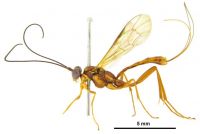ICHNEUMONIDAE: : Lissonota Gravenhorst 1829
-

Spiracle is at or before the centre of T1, glymma present as groove (not deep), ovipositor as long as body
-

Lissonota. Image © Steve Kerr
Diagnosis:
Characteristics of Lissonota include: 1. Body size varies but is ~10mm; 2. Position of spiracle on T1 is at, close to, or before centre; 3. Shape of aerolet in forewing is triangulate; 4. Colour of face is not all black; 5. Metasoma is sometimes compressed dorsal-ventrally; 6. Size of ocelli are small; 7. Length of antennae are as long, or longer than body; 8. Length of ovipositoris as long, or longer than body; 9. Wings present; 10. Colour of wings hyaline (clear); 11. Sternaulus absent; 12. Shape of face in lateral view is flat or only weakly bulging; 13. Sternite on T1 (viewed laterally not extending past spiracle; 14. Shape of T1 (viewed laterally) is evenly curved; 15. Number of teeth in mandibles: 2; 16. Patterns on metasoma is the same colour throughout; 17. Length of T1 subequal in length to T2 or sometimes longer than T2; 18. Sculpture on mesoscutum is finely pitted, many hairs; 19. Width of T1 (viewed dorsally) of uniform width (slightly widening posteriorly); 20. Glymma on T1 present as a groove (not a deep pit); 21. Sculpture on metasoma smooth with a semi-glossy or satin appearance at least on T2; 22. Propodeum length is very short (not reaching beyond coxal insertion).An additional technical character of Lissonota includes a lobe on the metapleuron which can be used to short-cut other characters.
Similarity to Other Taxa
Lissonota are mid-sized Ichneumonids in New Zealand. They are similar in size to: Dusona , Liotryphron , Habronyx , Phytodietus and Venturia . They can be separated from other similar-sized taxa by having the spiracle at or before the centre of T1, a glymma as a groove on T1, the ovipositor length long, a triangulate areolet in the forewing, and a lobe on the metapleuron.Compare
-

Liotryphon
T1 squat. -

Phytodietus
Ovipositor length distinct but not longer than the body, a petiolate areolet in the forewing. -

Dusona
Ovipositor length very short, spiracle on T1 well behind the centre of T1. -

Habronyx
Ovipositor length very short, no areolet in forewing, spiracle on T1 well behind the centre of T1. -

Venturia
The ovipositor length distinct but not longer than the body, metasoma bicoloured (orange/black), spiracle on T1 well behind the centre of T1.
Distribution in NZ
North Island: AK, BP, GB, HB, TO, WI, WN. South Island: NN, NC, SD, BR, MB, MC, DN, CO, OL, WD, FD, SI, MK, SL.
Species in NZ
Seven endemic species: Lissonota albopicta Smith, 1878; L. aspera Bain, 1970; L. atra Bain, 1970; L. comparata Cameron, 1898; L. flavopicta Smith, 1878; L. fulva Bain, 1970; L. multicolour Colenso, 1885.Biology & hosts
Lissonota is an extremely large genus with several hundred described species worldwide, however, the taxonomy of the group at species level is very difficult (Gauld 1984).Little is known about the biology of Lissonota in New Zealand, but L. flavopicta has been investigated for biological control of orchard leafrollers (Stephens et al. 1998). Despite being widespread and common, very few host records are known from Lissonota in New Zealand. L. flavopicta has been recorded from ‘Leptocroca’ scholaea (Lepidoptera: Oecophoridae) and Eudonia sabulosella (Lepidoptera: Crambidae) (Bain 1970).
Sources of information
Bain J. 1970. New Zealand species of Lissonota (Hymenoptera: Ichneumonidae). New Zealand Entomologist 4: 80-87.Gauld ID 1984. An Introduction to the Ichneumonidae of Australia. London, British Museum (Natural History). 413 p.
Gupta VK. 1987. The Ichneumonidae of the Indo-Australian area (Hymenoptera). Memoirs of the American Entomological Institute 41 (Part 1). 1-597 pp.
Stephens, M.J.; France, C.M.; Wratten, S.D.; Frampton, C. 1998. Enhancing biological control of leafrollers (Lepidoptera: Tortricidae) by sowing buckwheat ( Fagopyrum esculentum ) in an orchard. Biocontrol Science and Technology 8: 547-558.
Valentine EW & Walker AK. 1991. Annotated Catalogue of New Zealand Hymenoptera. DSIR Plant Protection Report 4. General Printing Services, 84 pp.
Citation
Ward DF & Schnitzler FR. 2013. Ichneumonidae of New Zealand. Genus Lissonota http://ichneumonidae.landcareresearch.co.nzAccessed: 26 April 2025

